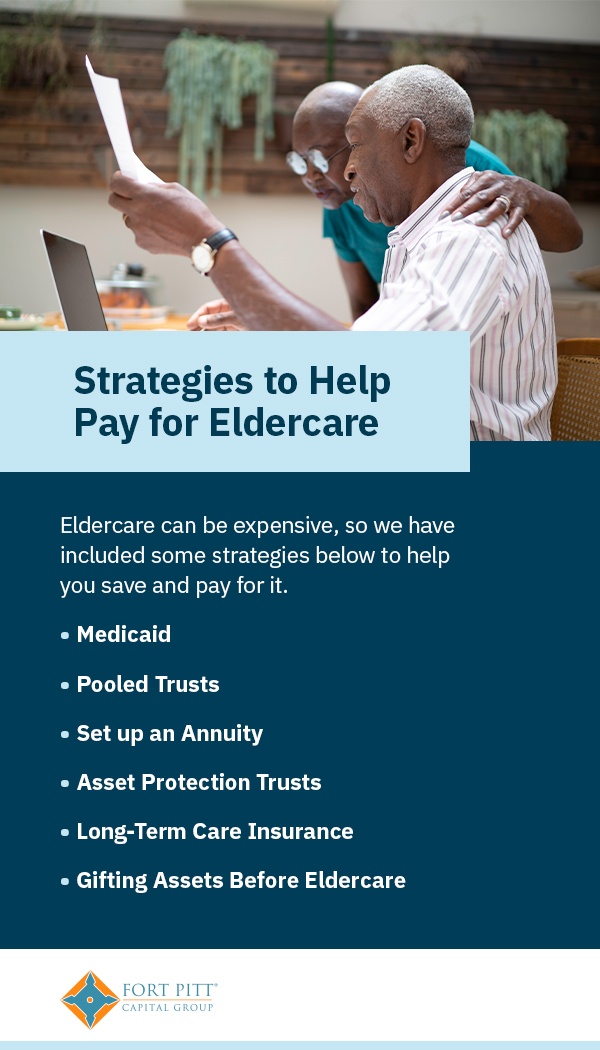A Guide to Financial Planning for Eldercare

Written by: Brad Newman | Financial Advisor
Whether you are an aging adult or the child of an aging parent, making financial decisions about housing needs, home care, and health care can be overwhelming and expensive. Now is the time to start planning for the expense of long-term senior care, but if you don’t know where to start, turn to the financial advisors at Fort Pitt Capital Group.
Everyone should have a financial plan for their future needs. Still, if you are the child of an aging parent with no retirement strategy in place, you may need to do some legwork to provide for your parent’s future needs. A sound financial plan should include a monthly budget, a review of health insurance plans to understand available coverage, a multi-year budget for significant capital expenses, and an overview of all liabilities and assets.
Financial Planning for Senior Care
A money management strategy is essential at any age or stage of life. However, your financial needs change as you reach different life milestones. For many older adults, managing money on a fixed income can be an intimidating. Below, we’ll cover financial planning for senior care so you can create a plan for the future.
Income
Many seniors rely on Social Security payments in their golden years. Millions of Americans receive Social Security benefits each year, so what you or your parent can expect to receive is a valuable addition to your financial planning. However, Social Security likely won’t cover all of your bills in retirement.
The first step to including income in your financial plan is creating your Social Security account. Any adult can set up an account, even before retirement age. You can use your account to quickly and securely view your benefits and manage them, as well as gain access to benefit calculators, customer support, and personalized estimates. Use these estimates to create a budget for future senior care.
Your retirement accounts are also a crucial income source during your later years. Before retiring, consider what your future expenses will be and plan accordingly. Retirement accounts may include:
- 403(b)
- 401(k)
- 457(b)
- Roth IRA
- Pensions
- Traditional IRA
Take advantage of any accounts that offer employer matching first, then max out your tax-advantaged accounts, such as a 401(k) or IRA. You may also want to include tax credits and deductions for seniors in your financial planning. Older adults can often take health care tax deductions, education deductions, investment-related deductions, and work-related deductions. Additionally, tax credits may be available, such as family and dependent credits, homeowner credits, health care credits, education credits, and income and savings credits.
Expenses
Insurance and medical bills are some of the main expenses to consider when making a financial plan. Even if you qualify for Medicare, you’ll still need to pay for several out-of-pocket medical expenses. Most couples need hundreds of thousands of dollars for health care alone in retirement, and many Americans greatly underestimate this expense.
You also need to remember housing expenses. Consider the costs of remaining in your home, especially if you receive living assistance, and the costs of living in a different type of housing, such as a retirement community. These expenses are critical to keep in mind during financial planning.
For example, you may be considering a reverse mortgage if you want to move to a new home or age in place. This type of loan can be a strategic use of your home equity, so you should carefully consider whether it is the right option for you and your family. Other typical expenses in retirement include life and auto insurance policies, taxes, utilities, transportation, groceries, debt, personal care, travel, leisure, and home maintenance and improvements.
Housing Options for Senior Family Members
Your parents likely want to stay in their home as long as possible. Aging in place can provide solace and comfort while lessening your financial strain. However, once your parents can’t live independently anymore, start considering other housing options that can keep your parents feeling secure and comfortable. Housing options vary dramatically in price and assistance, so you must consider each to determine which may be the right option for your family.
- Nursing homes: A nursing home offers on-call doctors and skilled, round-the-clock nursing services. A patient can receive more comprehensive medical care at a nursing home, along with meals and organized social activities. A nursing home can be a healthy option for those with more extensive medical needs.
- Independent living: In an independent living community, seniors still retain much of their freedom, but they also can enjoy meal services, transportation, socialization, and security.
- Memory care facility: Specifically designed for dementia or Alzheimer’s residents, a memory care facility offers assistance with daily living tasks, medical care, and socialization. These facilities have more stringent security measures to prevent patients from wandering off.
- Assisted living facilities: Choose an assisted living facility for a senior who wants more independence while still receiving socialization, medical care, and assistance with daily living tasks.
- Continuing care retirement communities: A continuing care retirement community is similar to a campus with tiered housing options. An aging person can choose from a nursing home, an assisted living facility, or independent living.
Types of Senior Care
There are various types of senior care, ranging from minimal home care to full-time living in a facility. Naturally, the more help a senior needs, the greater the costs of their care.
- Skilled care: Only a licensed professional can provide skilled care, as it includes medical care. Services can include assistance with operating medical equipment and administering medicines. Skilled care can occur at your parents’ home or a qualified nursing facility.
- Hospice care: End-of-life care, also known as hospice care, is for terminally ill patients. Hospice and palliative care can occur at the patient’s home or in a hospice facility. The location you choose could impact the cost of the care.
- Memory care: This type of care is for those with Alzheimer’s disease or dementia and takes place in a facility with added security that prevents patients from wandering away alone. Due to the extra attention required, memory care typically costs more than care from an assisted living facility.
- Adult daycare: This drop-off service allows your aging parent to receive care while you’re at work. You can choose adult daycare that is either social care or health care. Adult day health care is more expensive than social adult daycare, as it includes medical assistance.
- Palliative care: The focus of palliative care is on pain relief rather than on treatment. Usually, this type of care is a hallmark of hospice facilities. However, some patients who receive palliative care are not in hospice. You can choose to have palliative care performed by a medical professional in your parents’ home or in a residential facility, which can determine how much care costs.
- Long-term care, non-medical home care, or custodial care: These terms are essentially interchangeable, referring to assistance with everyday tasks. You may receive help with activities like dressing, bathing, and preparing meals. A non-licensed worker can perform this type of care, as it is not medical. An aging adult can receive this care at home, which is less expensive than custodial care in a nursing home or assisted living community.
- Virtual companion care: Virtual companion care is relatively new, offering security and virtual companionship through internet monitoring. Typically, the fee for virtual companion care is minimal.
Legal
Finally, financial planning should also contain legal considerations. One of the most critical legal aspects is will and estate planning. Though it can be hard to think about, it’s essential to determine what you want to happen to your assets and belongings after you pass away.
When you create your will, you will name all your beneficiaries and determine how and when your assets will be distributed. You should also assign a power of attorney who will help protect your safety and health.
Strategies to Help Pay for Eldercare
Eldercare can be expensive, so we have included some strategies below to help you save and pay for it.
1. Medicaid
Apply for Medicaid to help pay for eldercare. This joint state and federal program is the largest in the nation for providing health-related services to low-income individuals. Medicaid typically covers nursing home services, though the program’s specifics vary from state to state. Medicaid may even cover services that allow your parents to remain in their home.
2. Pooled Trusts
A pooled trust can protect some income if you live in a nursing home or a continuing-care retirement community. When you have a pooled trust, you can arrange for your excess income to go to a charitable organization rather than defray the cost of your care. While you will no longer have control over the money, you can send bills to the charitable organization for payment.
If you continue to live at home, you could use the money for food and utilities. Medicaid has relatively low limits, and a pooled trust could allow you to defray everyday living costs.
3. Set up an Annuity
If you need to apply for Medicaid before the look-back period’s expiration, you may still be able to preserve a large portion of your assets via a promissory note or a private annuity. For example, you can use your monthly annuity payments to help pay for your nursing home bill until you are eligible for Medicaid.
Typically, an annuity is most beneficial for lower-net-worth individuals rather than high-net-worth individuals. Structure your private annuity with an elder law attorney.
4. Asset Protection Trusts
You can shelter your assets with an asset protection trust and avoid impacting your Medicaid eligibility. You can choose from either a revocable or irrevocable trust.
- Revocable trusts: These trusts allow you to retain the right to change the arrangement. However, a revocable trust cannot help you qualify for Medicaid.
- Irrevocable trusts: These types of trusts transfer assets to a trustee’s control, removing them from the senior’s control. After establishing an irrevocable trust, you cannot break or alter it without the beneficiaries’ permission.
5. Long-Term Care Insurance
You can purchase long-term care insurance to cover some of the costs associated with types of senior care, such as adult daycare, home health care, or nursing home care. However, remember that long-term care insurance is frequently expensive, so it may not be the right option for everyone. However, buying this insurance before retirement can make it more cost-effective.
6. Gifting Assets Before Eldercare
One of the most straightforward options is to give the assets to a responsible family member, such as an adult child. Of course, this can also be a risky choice. After you transfer the assets, they legally belong to the other person. Even if you trust this person, events in their life could jeopardize the money — such as a divorce, a lawsuit, or business failure. To avoid these risks, you may want to create a trust instead.
Eldercare Financial Planning Checklist
Adult children and loved ones concerned about an aging adult’s financial situation should have a discussion with them. Use this time to create an eldercare planning checklist that covers as many living expenses and important information as possible.
A checklist can help keep you on track. It ensures your aging parent can maintain their savings and have enough to cover their needs. Things to remember when financial planning for an elder include:
Finances
Start eldercare financial planning by gathering the contact information of any advisors your aging loved one uses. Check to see that the correct names and permissions are on all accounts and have a list of where they are held. Review your aging parent’s income sources, such as their:
- Pensions
- Veteran’s benefits
- Employment income
- Supplemental Security Income
- Social Security
- Reverse mortgage
Next, review Social Security benefits. You should also see if there are any ways you can consolidate accounts and take the time to update beneficiary designations. Do what you can to streamline bills by setting up automatic payments when possible.
You can also speak with a professional for financial assistance to see if the individual’s residence needs modification to help them stay at home longer and determine if they need geriatric care or meal services.
Investments
You will also need to look into the type of investments the aging individual has. These could include:
- Certificate of deposit
- IRAs
- Mutual funds, stocks, or bonds
- Real estate
- Annuities
- Other investments
Determine where these investments are and gather the original documentation for them. You should also determine the amount of each investment.
Insurance Policies
Start by setting up a meeting with your loved one’s insurance advisor to discuss current and long-term care policy options. Write down all policies and have a copy of each. These policies include:
- Health insurance
- Life insurance
- Long-term care policies
- Other insurance
Look at your elder’s health insurance policy, make any necessary updates and do the same for the Medicaid planning strategy. For example, see if they will need Medigap to pay for costs not covered by Medicare. Check and update homeowners’, auto, and umbrella liability policies.
Legal Documents
Be sure to look over any legal documents. See if there is an estate plan or will. If there is, discuss whether any changes need to be made to beneficiaries, executors, or any other portion. Ensure you understand what the assets are, their value, and how they are managed. The estate plan should include:
- Investment accounts
- Real estate
- Household items
- Retirement plans
Check to see if there is a medical power of attorney and advanced directive that determines what your loved one would like for life-prolonging care. Find out if there is a power of attorney for their finances as well. You should also know the location of all important documents, including deeds, birth certificates, passports, wills, and marriage licenses.
Living Arrangements
Determine if money is available for living arrangement contingencies like long-term care insurance and savings. Look at your aging loved one’s plans for living arrangements if their spouse or partner becomes ill, acquires a disability, or passes away.
Also, decide if the current living situation is acceptable. Even if it is currently, you might want to make a plan for changes that may need to happen later. Looking into caregiver agreement documentation can help in the planning process, too.
Health Care
Write down all the doctors your aging parent sees and all their current prescribed medications. Ensure health insurance and any supplemental policies can accommodate their wishes, such as being accepted at the hospital they use.
Make a list of your older adult’s wishes for different medical scenarios. Gather any health care cards and obtain copies because they are necessary for doctor’s visits and applying for benefits.
Eldercare FAQ
Planning for the finances and legalities of eldercare can be a complicated process. For additional information, we answer some of the most frequently asked questions we receive about eldercare below.
What Legal Documents Do We Need?
There are several critical legal eldercare documents, including a durable power of attorney, a living will, an advance directive, a health care power of attorney, and a Do Not Resuscitate or Do Not Intubate order. Though you may not need an attorney to help you with all these documents, legal assistance can be beneficial. Note that you cannot create a power of attorney without a lawyer.
How Can You Keep Your Elderly Parents Fit and Active?
Elders should remain active to retain their health and independence. Exercise is especially crucial for balance, strength, endurance, and flexibility. Even if an older adult has lost some function in any of these areas, exercise can help them restore or maintain their physical capacity. Regardless of their age or frailty, some activity is possible and necessary for treating or alleviating the symptoms of chronic conditions.
Why Does the Caregiver Need Care?
Caregivers give so much of themselves when looking after another person. Many caregivers handle daily tasks and errands that can take up most of their time. If the caregiver fails to practice self-care on top of tackling so much unpaid care, the toll can be physically and emotionally significant. This is especially true when caring for an elder who is bad-tempered, demanding, or uncooperative.
Contact Fort Pitt Capital Group
Look no further than Fort Pitt Capital Group for a team of financial advisors. We have decades of experience offering various financial services (including financial planning, wealth management, and investment analysis) to create personalized results. We can ensure you have the proper allocations at the right risk level, so you can rest easy knowing a professional team is managing your assets and making your money work to its highest potential.
Our services are highly individualized, and doing what is best for you is our top priority. Schedule a personal meeting at Fort Pitt Capital Group to discuss your investment objectives and goals with us.
About the Author:
Brad Newman
Financial Advisor
Fort Pitt Capital Group, LLC
507 N. Front Street, Harrisburg, PA 17101
(717) 260-9281 | bnewman@fortpittcapital.com







